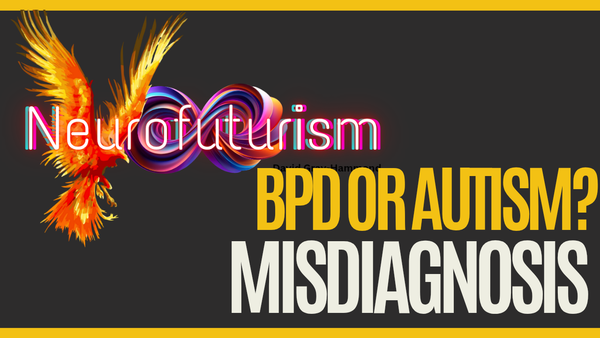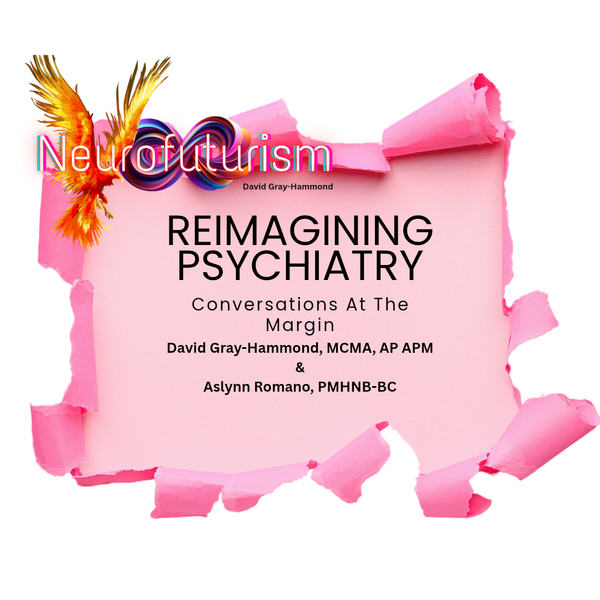Unmasking The Impact of Alexithymia on Autistic Lives
This article explores the impact of alexithymia on Autistic people, challenging common misconceptions about their empathy and social communication. It delves into how alexithymia affects social interactions, mental health support, and self-image. The article advocates for a shift in societal attitud

Autistic people experience a number of differences in how they process and engage with the world around them. One of the most prevalent differences that is experienced is alexithymia.
"...it means that you can’t match up the internal signals of your emotions with words to describe your emotions... This is because alexithymia relies on one of our senses called interoception. This sense allows us to feel the internal state of our body... Because Autistic people experience interoception differently, it affects our ability to identify and describe our emotions...."
Gray-Hammond (2023a)
While alexithymia is widely acknowledged as an Autistic trait both in community spaces and research literature. Estimates of how many experience alexithymia sit around 50% (Neff, 2024; Kinnaird et al, 2019) compared to only around 5% of the general population (Kinnaird, 2019).
Does Alexithymia Make Autistic People Less Empathic?
Research indicates that autism itself does not reduce empathy itself, however alexithymia may have a relationship with how we experience empathy (Bird et al, 2010). On the surface it seems logical to suggest that a reduced capability to identify and describe emotions may reduce empathy. I, however, would posit that we still feel those emotions, and subsequent empathy for others. What we struggle with is processing how that empathy makes us feel and accounting for it's impact on our wellbeing. Let us not forget that many Autistic people report experiencing hyper-empathy (Gray-Hammond, 2023b). Differences caused by the impact of alexithymia on how we embody empathy do highlight some issues however.
Alexithymia, Social Communication, and The Double Empathy Problem

The double empathy problem attests that Autistic and non-Autistic people are naturally predisposed to struggling to empathise with each other. This is because the difference in cultural and practical life experiences between these two different groups are so fundamentally different that it is difficult for one group to understand the others worldview (Milton, 2012).
Autistic people are accused of lacking social reciprocity and empathy because their way of experiencing and performing those things are in a minority of experience. Dominant ideas of what is considered "normal" behaviour have created a normative attitude within which many neurodivergent people have a lack of empathy and communicative skill by virtue of it's difference. Miscommunication can often happen because we are not empathising in "the right way". We are seen as not caring for the feelings of others due to needing more processing time and embodying that empathy differently.
I have suggested previously that Autistic people do not lack sociality, we are instead AuSocial (Autistically Social). That is to say they have their own culture and styles of communication:
"...AuSocial culture is a complex and highly developed set of communication, language, and socialisation skills that can only be witnessed between Autistic people. Rather than being deficient in our social exchanges, we often achieve a great deal and naturally fight to try and improve the world for our neurokin."
Gray-Hammond (2023c)
I would argue that the drive to help others that so many of us have nullifies any suggestion that we are anti-social or lack empathy.
Accessing Therapy and Other Mental Health Support
It is widely discussed in Autistic community spaces that Cognitive Behavioural Therapy (often seen as a gold standard treatment for mental health issues) lacks effectiveness. Research has suggested that clinicians provide more positive reports than parents or service users, and that it's long-term efficacy is questionable for Autistic people (Sharma et al, 2021). While much of the research assesses the outcomes, there is very little to discuss why Autistic people find it so lacking.
If we consider therapy broadly, it often requires us to identify emotional responses to situations and see their relationship to the actions we take in our lives. In the case of alexithymia, this is not a simple process. Alexithymic people accessing mental health support may struggle to identify emotions beyond whether they are negative or positive. It may be challenging to relate the abstract nature of emotions to observable behaviour.
Consider an Autistic person who answer the age old question of "How does that make you feel?" with "I don't know". After a while of giving this response, professionals will often accuse them of not engaging or not wanting to do the work. It is an example of how AuSociality is misinterpreted as intentional defiance via the double empathy problem. This is reflected in healthcare professionals who rated their comfort supporting Autistic patients at 4.6 out of 10 (Corden et al, 2022). It also further highlights the importance of community guided mental health support that have shown promise in improving outcomes (Schwartzman et al, 2024).
The Pipeline to Negative Self Image
Characteristics of autism appear to correlate with lower self-esteem (Nguyen et al, 2020). I would suggest that in the case of alexithymia, it has been effectively weaponised to invalidate and pathologise Autistic embodiment and performance. To consider it another way, Autistic people are told that their difficulty identifying emotions is a deficit, or a total lack of emotionality. These attitudes are internalised, creating a sense of worthlessness and sub-humanity.
It is unsurprising that Autistic people who feel have higher self-esteem feel less helpless and more accepted (Nguyen, 2020). We need to consider that current mainstream attitudes towards autism are creating an epidemic of mental health needs in Autistic populations. Mental health needs that are difficult to manage (in part) due to the misinterpretation of alexithymia.
Mitigating The Impact of Alexithymia on Autistic People
The issues highlighted thus far are far from a comprehensive list. In order to tackle inequalities such as the perception of Autistic emotionality and AuSociality we have to take a broad look at the landscape of experience for this group of people. While many external to the experience perceive disclosure and open communication of an autism diagnosis as a positive, Autistic people themselves often report negative outcomes and stigma (Thompson-Hodgetts et al, 2020).
Autistic people with access to peer-led community see a reduction in the effects of minority stress (Botha, 2020). In simple terms, the impact of collective discrimination and stigma is reduced by community access. However, research indicates that there is a link between already having positive views of autism and attitudes towards community engagement (Cooper et al, 2021). This raises the question; how do we help Autistic people feel positive about their autism when core features such as alexithymia are weaponised against them?
I put it to society that in order to mitigate the impact of alexithymia on Autistic people and improve their collective wellbeing, we have to engage in critical assessment of the attitudes and stigmas that exist around this identity. If we can stop seeing alexithymia as the death of empathy, and create therapeutic spaces where Autistic people can explore their emotions without the need to explicitly identify them, then Autistic people will be able to feel more positively about their identity. This in turn increases their likelihood to engage with community spaces and access the support that they need in a world that is hostile to their existence.
It sounds like a simple problem with a complicated answer, but the tirade of negativity imposed upon Autistic people can be help responsible for much of the negative outcomes. Autistic people deserve to feel good about themselves.
References
Bird, G., Silani, G., Brindley, R., White, S., Frith, U., & Singer, T. (2010). Empathic brain responses in insula are modulated by levels of alexithymia but not autism. Brain : a journal of neurology, 133(Pt 5), 1515–1525. https://doi.org/10.1093/brain/awq060
Botha, M. (2020). Autistic community connectedness as a buffer against the effects of minority stress (Doctoral dissertation, University of Surrey).
Cooper, R., Cooper, K., Russell, A. J., & Smith, L. G. (2021). “I’m proud to be a little bit different”: The effects of autistic individuals’ perceptions of autism and autism social identity on their collective self-esteem. Journal of Autism and Developmental Disorders, 51, 704-714.
Corden, K., Brewer, R., & Cage, E. (2022). A systematic review of healthcare professionals’ knowledge, self-efficacy and attitudes towards working with autistic people. Review Journal of Autism and Developmental Disorders, 9(3), 386-399.
Gray-Hammond, D. (2023a). What is alexithymia? Emergent Divergence. https://emergentdivergence.com/2023/06/30/what-is-alexithymia/
Gray-Hammond, D. (2023b). Hyper-empathy, mirror-touch synasthaesia, and the Autistic experience of pain. Emergent Divergence. https://emergentdivergence.com/2023/07/24/hyper-empathy-mirror-touch-synesthesia-and-the-autistic-experience-of-pain/
Gray-Hammond, D. (2023c). AuSocial: Towards an understanding of Autistic social culture. Retrieved from https://emergentdivergence.com/ausocial-towards-
an-understanding-of-autistic-social-culture/
Kinnaird, E., Stewart, C., & Tchanturia, K. (2019). Investigating alexithymia in autism: A systematic review and meta-analysis. European Psychiatry, 55, 80-89.
Milton, D. E. (2012). On the ontological status of autism: The ‘double empathy problem’. Disability & society, 27(6), 883-887.
Neff, M. A. (2021). Autism and alexithymia: Similarities, differences, and overlap. Retrieved from https://neurodivergentinsights.com/autism-and-alexithymia/
Nguyen, W., Ownsworth, T., Nicol, C., & Zimmerman, D. (2020). How I see and feel about myself: Domain-specific self-concept and self-esteem in autistic adults. Frontiers in Psychology, 11, 913.
Schwartzman, J. M., Roth, M. C., Paterson, A. V., Jacobs, A. X., & Williams, Z. J. (2024). Community-guided, autism-adapted group cognitive behavioral therapy for depression in autistic youth (CBT-DAY): preliminary feasibility, acceptability, and efficacy. Autism, 28(8), 1902-1918.
Sharma, S., Hucker, A., Matthews, T., Grohmann, D., & Laws, K. R. (2021). Cognitive behavioural therapy for anxiety in children and young people on the autism spectrum: A systematic review and meta-analysis. Bmc Psychology, 9, 1-16.
Thompson-Hodgetts, S., Labonte, C., Mazumder, R., & Phelan, S. (2020). Helpful or harmful? A scoping review of perceptions and outcomes of autism diagnostic disclosure to others. Research in Autism Spectrum Disorders, 77, 101598.


